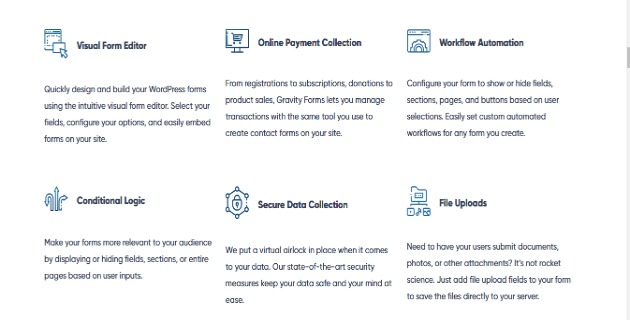Gravity Forms is a powerful WordPress plugin designed to simplify the process of creating complex forms without requiring coding skills. Known for its robust features and user-friendly interface, Gravity Forms has become a staple for WordPress websites of all sizes. Whether you need a basic contact form, a payment form, or a survey, Gravity Forms has the tools to bring your ideas to life.


Key Features of Gravity Forms
Gravity Forms is packed with features that make it a top choice for WordPress users. Here are some of the standout aspects:
- Drag-and-Drop Form Builder
Gravity Forms offers an intuitive drag-and-drop interface that allows users to quickly build forms by simply placing fields where they want them. This interface is beginner-friendly, allowing even non-technical users to create professional-looking forms with ease. - Advanced Conditional Logic
One of the most powerful features of Gravity Forms is its conditional logic. This feature allows you to create dynamic forms that display or hide fields based on user input, providing a customized user experience. For example, if a user selects “Yes” to a question, additional questions or fields can appear, streamlining the form-filling process. - Multi-Page Forms
Gravity Forms allows you to create multi-page forms, ideal for surveys or long forms that require segmented information. The pagination feature enables users to move through forms without feeling overwhelmed by a single, lengthy page. - Email Notifications
For businesses or individuals who need to stay updated on form submissions, Gravity Forms provides email notifications. This feature allows you to receive alerts every time someone submits a form, ensuring you never miss an important interaction.

- Spam Protection with Google reCAPTCHA
Gravity Forms integrates seamlessly with Google reCAPTCHA, Akismet, and other anti-spam tools to protect your site from spam submissions. This feature helps maintain data quality and saves time by filtering out unwanted entries. - File Uploads and Attachments
Gravity Forms supports file uploads, making it easy for users to submit files directly through the form. This feature is beneficial for applications such as job submissions, support requests, or any situation requiring additional documentation. - Third-Party Integrations
Gravity Forms offers extensive integrations with popular third-party tools, including Mailchimp, PayPal, Stripe, Zapier, and more. This flexibility means you can connect Gravity Forms to your CRM, email marketing platform, or payment gateway for seamless data flow. - Developer-Friendly Customizations
Gravity Forms offers robust options for developers looking to customize their forms further. With extensive hooks, filters, and APIs, developers can create custom solutions tailored to their specific needs, making it a versatile tool for advanced applications.
Pros of Using Gravity Forms
1. Ease of Use
Gravity Forms’ drag-and-drop editor makes it incredibly user-friendly. Beginners and professionals alike find the interface easy to navigate, allowing users to create complex forms in minutes.
2. High Customizability
The plugin is highly customizable, allowing for personalized forms that can include conditional logic, custom CSS styling, and various field types. This customization ensures that forms can align with any website’s design and functionality.
3. Reliable Support and Documentation
Gravity Forms offers extensive documentation and a dedicated support team to help users navigate the platform. With online tutorials, a community forum, and email support, users are well-equipped to resolve any issues they might encounter.
4. Secure Data Handling
Security is a priority for Gravity Forms. With features like file upload restrictions, data encryption, and GDPR compliance options, users can rest assured that their data is handled safely.
5. Great for Lead Generation and Data Collection
Gravity Forms is ideal for businesses focused on lead generation. By integrating with CRM and email marketing tools, Gravity Forms enables efficient lead capture and nurtures leads with automated workflows.
Cons of Using Gravity Forms
While Gravity Forms is a powerful tool, there are some limitations to consider:
1. Premium-Only Plugin
Gravity Forms doesn’t offer a free version. While some WordPress form plugins provide basic functionality for free with paid upgrades, Gravity Forms is a premium-only plugin. This can be a drawback for budget-conscious users who may be looking for a free alternative.
2. Limited Styling Options Without Custom CSS
Although Gravity Forms has some built-in styling options, more advanced styling typically requires custom CSS. Users without CSS knowledge may find it challenging to achieve certain design elements.
3. Annual Licensing Costs
Unlike some plugins that offer lifetime licenses, Gravity Forms requires an annual subscription. For users looking for a long-term solution, these recurring costs can add up, particularly if you require multiple licenses.
Gravity Forms Pricing
Gravity Forms offers three primary pricing tiers:
- Basic License: Starting at $59 per year, this plan includes essential features and add-ons, such as Mailchimp, AWeber, and basic integration options.
- Pro License: Priced at $159 per year, this plan adds more advanced add-ons, including integration with Stripe and PayPal, HubSpot, and Slack. It’s suitable for small to medium-sized businesses needing a bit more functionality.
- Elite License: At $259 per year, this plan includes all features and add-ons, as well as multi-site support, making it ideal for developers or larger businesses managing several sites.
Gravity Forms’ pricing structure ensures that users only pay for what they need, but the absence of a free version can be a limitation for some users.
Who Should Use Gravity Forms?
Gravity Forms is an excellent choice for businesses, developers, and individuals who need a versatile form builder with advanced capabilities. It’s particularly suitable for:
- Small to Medium-Sized Businesses: Gravity Forms offers robust integrations for lead generation, CRM, and payment processing, making it a great fit for businesses focused on data collection and conversion.
- Developers: With extensive developer support and customization options, Gravity Forms is ideal for developers building client sites or custom applications.
- Nonprofits and Educational Institutions: Gravity Forms makes it easy to collect donations, applications, and surveys, all within a secure framework.
Final Verdict: Is Gravity Forms Worth It?
Gravity Forms is undoubtedly one of the most feature-rich form plugins for WordPress. With a drag-and-drop interface, extensive customization options, third-party integrations, and advanced conditional logic, it’s a versatile tool for creating everything from simple contact forms to complex, multi-page applications.
While it comes with a premium price tag, the plugin’s flexibility and range of features make it a worthwhile investment for businesses and developers looking for a reliable, scalable solution. If your budget allows, Gravity Forms is a strong choice that will likely meet your needs for the long term.



